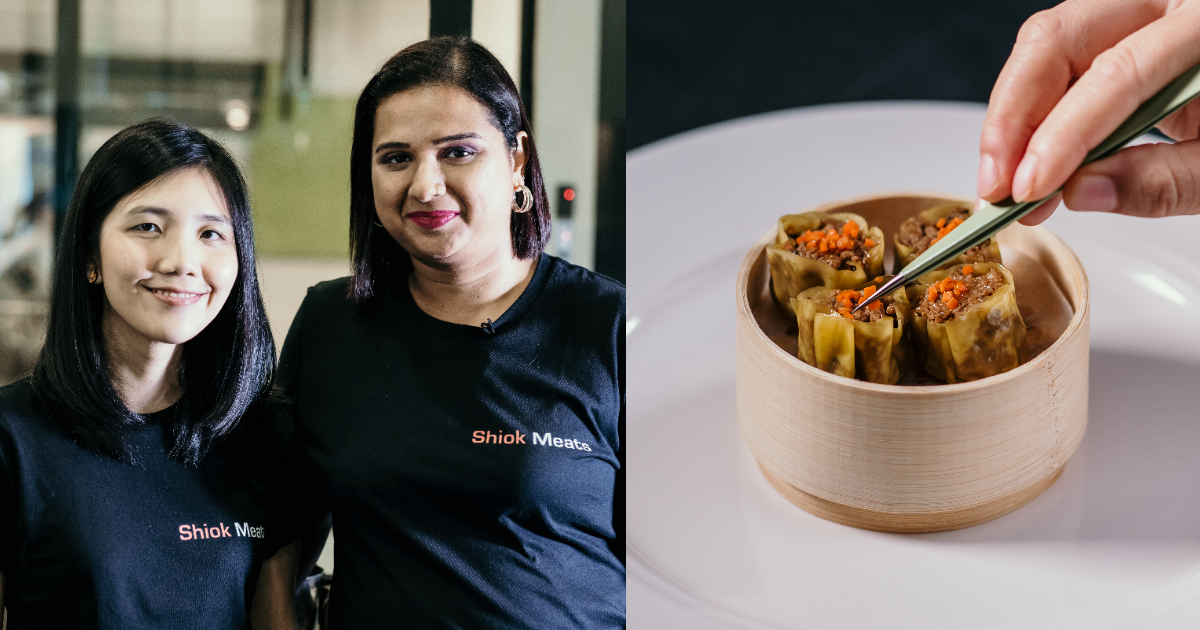Fancy siew mai made from cell-based meat with the same taste and texture as real meat sans the animal cruelty and environmental impact?
Meet Shiok Meats (“Shiok”) which is disrupting the seafood industry — it is the first-of-its-kind clean meat company in Singapore and Southeast Asia.
‘Shiok’, which essentially means fantastic and delicious in local slang, specialises in clean and healthy seafood and meats harvested from cells instead of animals.
However, back in 2015/2016, there was a lack of opportunities in biomedical research for out-of-the-box thinkers and doers, said Dr Sandhya Sriram, CEO and co-founder of Shiok Meats.
With “the drive to innovate and disrupt, especially in the sustainability sector”, two female scientists Sandhya and co-founder Dr Ka Yi Ling set out to transform the industry.
Cultivating Cell-Based Meats

35-year-old Sandhya is a stem cell scientist with over 10 years of experience working with muscle, adipose, cells and stem cells.
After graduating with a PhD from Nanyang Technological University in
Singapore, Sandhya pursued her postdoc at A*STAR in Singapore. Following four years of postdoctoral work, she took up business development at a research institute.
Alongside, she co-founded two companies, Biotech In Asia and SciGlo. Sandhya has been featured on Forbes Women in Tech for her entrepreneurial ventures.
When Shiok started in August 2018, the alternative protein industry was nascent in Singapore and Shiok was the first-ever cell-based meat company in the region, so we had to face a lot of challenges to even get started and setup.
In 2018, Shiok needed to use a lab offshore because none were available in Singapore that suited our needs. We are not a spinoff from any university or institute — we are an independent company that started with just an idea and minimal angel investment — so it was hard to find lab space, funding, et cetera.
– Dr Sandhya Sriram, CEO & co-founder, Shiok Meats

Shiok stands out from other cell-based meat production companies because of its proprietary technology that isolates stem cells from shrimp, lobster, and crab — they are the first company to be able to do this for cell-based production.

Once the stem cells are harvested, the shrimp, lobster, and crab meats are grown in nutrient-rich conditions, similar to that of a greenhouse.
After four to six weeks, the cell-based seafood is exactly the same as its conventional counterpart but more sustainable, clean, and nutritious.
Shiok’s patent-pending technology can grow crustaceans four times faster than conventional production.
Raised $20.4M Funding To Date
The duo set up the company with an angel investment of $10,000 that grew to $50,000, and then closed a seed round of $4.6 million in about eight months of incorporation.
To date, Shiok has raised a total of $20.4 million in funding over three rounds.
Its most recent round of funding in September 2020, which saw them raising $12.6 million in Series A funding.
The round is led by Aqua-Spark, the first investment fund focused on sustainable aquaculture.
The funds will go towards building the first-of-its-kind commercial
pilot plant from which ‘Shiok’ plans to launch its minced shrimp product in 2022.

The output of Shiok’s pilot plant will be frozen cell-based shrimp meat for dumplings and other shrimp-based dishes.
Beyond cell-based shrimp, Shiok plans to launch shrimp flavouring paste and powder, fully-formed 3D shrimp, and cell-based lobster and crab products in the coming years.
Disrupting The Seafood Industry
The cell-based shrimp, which is also their flagship product, offers clean, traceable alternatives to the shrimp farming industry.
The shrimp market is worth $50 billion globally with Vietnam, Thailand, Indonesia, and India being the major producers of shrimp.
While there are many farms and technologies improving shrimp farming, there is still work to be done.
Typically, shrimp is raised in crowded factories or farms and treated with antibiotics, chemicals, and hormones.

This conventional production method often contribute to overfishing, excessive bycatch, misrepresentation, and mislabelling as well as contamination with effluents, heavy metals, and micro plastics.
This form of production is unsustainable and the sector strain will only increase as the population grows.

According to Shiok, clean meat production could reduce the industry’s greenhouse gas emissions by 96 per cent, energy consumption by 45 per cent, land use by 99 per cent, and water consumption by 96 per cent.
Startups and food giants are working to invent and improve alternatives to traditional meat production as consumers become more careful about nutrition and the environment.
While fake-meat companies such as Impossible Foods and Beyond Meat are expanding into new markets, other startups are working on laboratory-grown alternatives who want to enjoy the meat and seafood experience without sacrificing animals.
So far, Shiok Meats shows to be highly promising in their research and development.
Featured Image Credit: Shiok Meats








